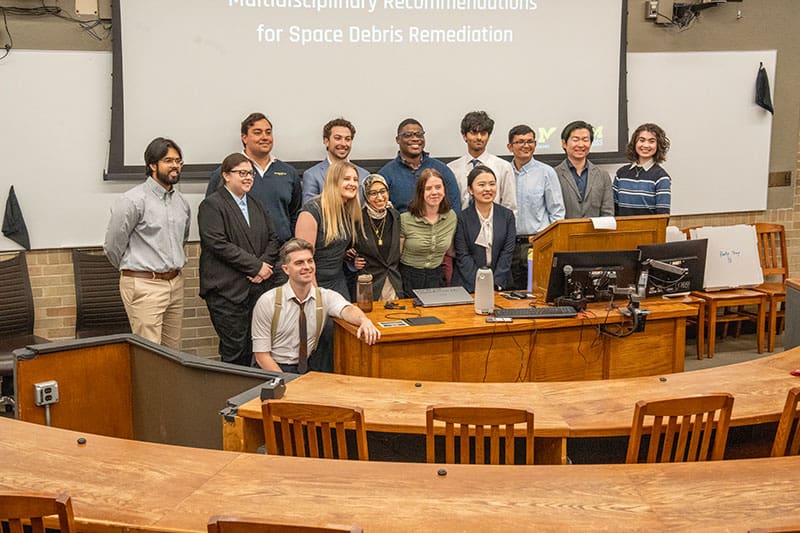The Problem Solving Initiative (PSI) course series, where students from a variety of academic backgrounds come together and learn how to collaborate and solve problems, recently drew its latest iteration to a close with an end-of-semester presentation and forum.
The PSI is a collection of courses that brings together graduate and professional students and faculty from multiple disciplines to apply creative problem solving, collaboration, and design thinking skills to complicated and timely issues. PSI students collaborate and interface with faculty to explore these issues from the perspective of their own and other disciplines, eventually designing and proposing solutions.
This semester’s PSI was co-taught by U-M Law School Professor Donald Moore and U-M Aerospace Engineering Assistant Professor Oliver Jia-Richards and covered the topic of how to handle and remove debris from space.
“This type of multi-disciplinary class is designed to introduce students to the type of thinking and collaboration they will need to master as they progress in their careers,” said Prof. Moore. “This year’s class was focused on space debris removal and our plan is to make this an on-going initiative, focusing on a new “space problem” each year.”
Students in this semester’s PSI represented the Aerospace Engineering program, as well as the U-M Law School, Ford School of Public Policy, Ross School of Business and the School of Social Work.
“This class was unlike any I have taken during my time at Michigan,” said U-M Aerospace Engineering’s Zoe Pizzuti. “Being able to regularly communicate with legal and policy students was integral to our success as a class. Hearing my classmates’ perspectives on a problem I have only understood from an engineering standpoint painted a comprehensive picture, allowing our engineering team to create more feasible, well-rounded solutions.”
This unique class format emphasizes the complex nature of problems that span disciplines, and empowered students to bridge gaps between disciplines to solve problems.
“This experience helped me grow in ways that traditional law school classes don’t always allow,” said Ibrahim Mohyuddin, a U-M Law School student. “It prepared me to engage with technical experts, assess emerging regulatory challenges, and think creatively about complex systems where legal solutions alone aren’t enough. It also gave me a much stronger understanding of how to design policy that is both legally sound and practically implementable—a skill I know will serve me well in my future work.”
The class also welcomed guest speakers throughout the semester from academia and the private sector. This included Moriba Jah from the University of Texas, and Adam Kall, Co-Founder and Director of Science at Kail Morris, a company that deals with space debris.
“Part of the objective of this course was to take a critical look at these proposed solutions [for space debris removal] and understand which ones may have significant promise not only from an engineering perspective, but also considering the regulatory and economic constraints on the actual implementation,” said Prof. Jia-Richards.
Students appreciated this emphasis on mirroring the challenges and opportunities that students could face in future professional endeavors.
“This class definitely prepared me for conversations with other professionals who might have different backgrounds than me, both academically and personally,” said Pizzuti. “I thoroughly enjoyed my time in the Problem Solving Initiative, and recommend it to any graduate students looking to have interesting, interdisciplinary conversations that generate innovative ideas.”
At the PSI’s closing presentation and forum, where the team of students presented on their assessment of the issue of space debris, along with proposed solutions, U-M Law School Academic Programs Director Amber Conway echoed the importance of mirroring real world scenarios.
“Students are given support, not solutions, and it can be chaotic,” said Conway. “It can mimic frustrations of the workplace, including not always reaching a perfect solution for complex problems. However, the cross-disciplinary approach means there’s discovery of new ways to address the problem.”
“Part of our goal as instructors was to stay as much as possible out of the students’ way, and let them drive the proposed solutions,” added Prof. Jia-Richards. “ We tried to serve more as guard rails, making sure they didn’t stray too far from the course goal, but giving them the space to develop different ideas.”
While this PSI cohort did develop and present a series of compelling potential solutions, they also understood what the truly valuable takeaways were from the course.
“This class helped me learn how to insert Engineering into other disciplines,” said Rawan Aljaber, an Aerospace Engineering student. “We need to speak in ways that are translatable to achieve innovation.”Past PSI topics have included slavery’s legacy in architecture and law, and the challenges facing law enforcement in Native American communities. Learn more about the PSI and how to enroll on the U-M Law School website.
